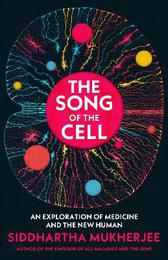
|
The Song of the Cell: An Exploration of Medicine and the New Human
Paperback / softback
Main Details
| Title |
The Song of the Cell: An Exploration of Medicine and the New Human
|
| Authors and Contributors |
By (author) Siddhartha Mukherjee
|
| Physical Properties |
| Format:Paperback / softback | | Pages:496 | | Dimensions(mm): Height 234,Width 153 |
|
| Category/Genre | Popular science
Cellular biology (cytology)
Human biology |
|---|
| ISBN/Barcode |
9781847925985
|
| Classifications | Dewey:571.6 |
|---|
| Audience | | General | | Tertiary Education (US: College) | | Professional & Vocational | |
|---|
|
Publishing Details |
| Publisher |
Vintage Publishing
|
| Imprint |
The Bodley Head Ltd
|
| NZ Release Date |
13 February 2023 |
| Publication Country |
United Kingdom
|
Description
From the author of The Emperor of All Maladies, winner of the Pulitzer Prize, and The Gene, a #1 New York Times bestseller, comes his most spectacular book yet, about the fundamental unit of life. Rich with Mukherjee's revelatory and exhilarating stories of scientists, doctors, and the patients whose lives may be saved by their work, The Song of the Cell is the third book in this extraordinary writer's exploration of what it means to be human Siddhartha Mukherjee is published in 38 languages, has won a Pulitzer amongst many prizes and The Emperor of All Maladies is one of TIME magazine's 100 Best Non-Fiction books of all time. The Observer said about it 'The notion of popular science doesn't come close to describing this achievement. It is literature.' Shot through with a bright thread of experience as a practising physician, his books are grand stories about medicine, science and the human body. This book is the story of the cell - past, present and future. Since the discovery of the cell in the 1660s and the discovery in the 1850s that most diseases can be traced back to our cells, human beings have been understood as an ecosystem of units that produce exponentially complex structures and effects. How did we discover these units, and their functions? How did we begin to understand hearts, brains, kidneys as collections of cooperating cells? What are cells anyway? How do they work, and how (why?) do they work together? Why build organs and organisms out of these units? And could we re-assemble a new kind of human? Could we alter cells to become resistant to diseases? Could we make new humans out of new kinds cells, endowed with novel properties, functions or intentions? This book is about the building block of life- the cell. Its story is the story of modern medicine.
Author Biography
Siddhartha Mukherjee is a cancer physician and researcher, a stem cell biologist and a cancer geneticist. He is the author of The Laws of Medicine and The Emperor of All Maladies- A Biography of Cancer, which won the 2011 Pulitzer Prize in general nonfiction and the Guardian First Book Award. Mukherjee is an assistant professor of medicine at Columbia University. A Rhodes Scholar, he graduated from Stanford University, University of Oxford, and Harvard Medical School. His laboratory has identified genes that regulate stem cells, and his team is internationally recognized for its discovery of skeletal stem cells and genetic alterations in blood cancers. He has published work in Nature, Cell, Neuron, The New England Journal of Medicine, the New York Times and several other magazine and journals. He lives with his family in New York City.
ReviewsBrilliant ... medical magic ... written with compassionate warmth and humour * Steven Poole, Daily Telegraph * Wonderfully ambitious... Cell biology is complex and as big a topic as life itself; I'm not sure a writer could cover it better * The Times * If you are not already in awe of biology, The Song of the Cell might get you there. It is a masterclass * Guardian * One of the most admired doctors in the world * The Times * Brilliant * The Times *
|